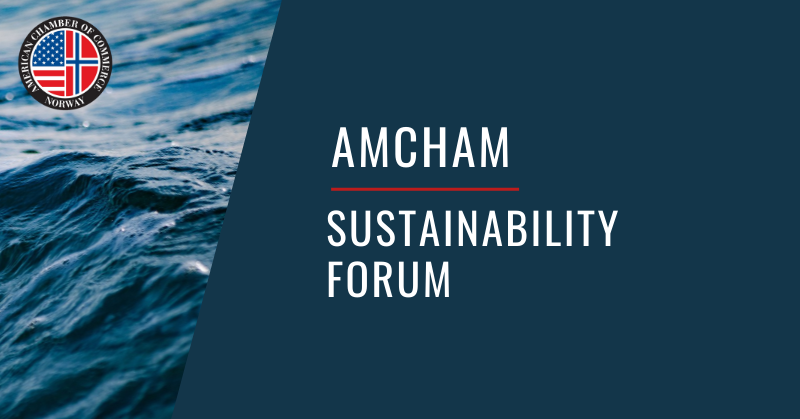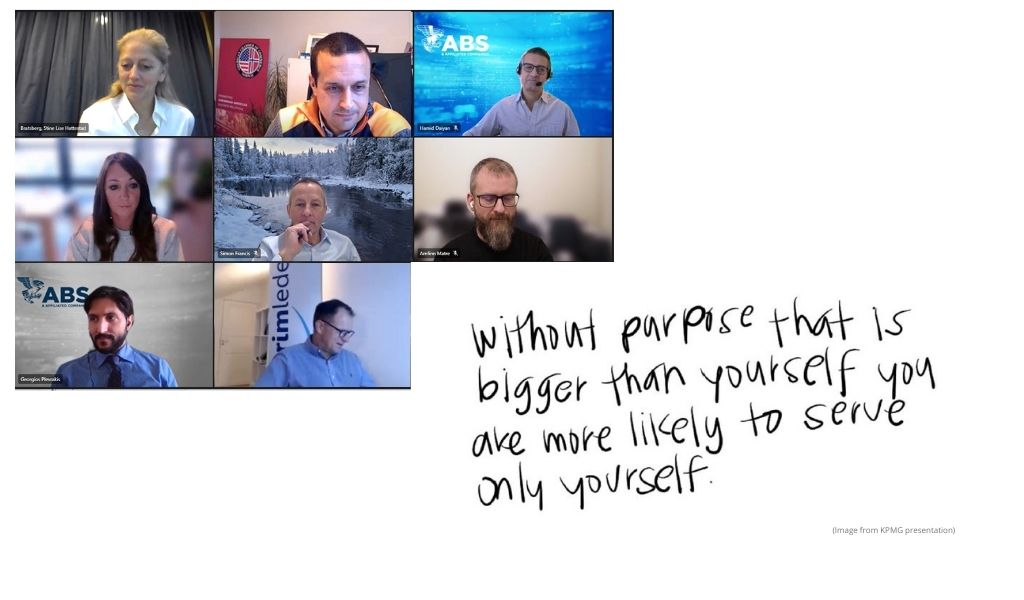AmCham Sustainability Forum: The Emerging Landscape of Decarbonization and Sustainable Cities
AmCham members representing a wide range of industries actively engaged in the latest AmCham Sustainability Forum, welcoming Georgios Plevrakis, Global Sustainability Director at the American Bureau of Shipping (ABS) and Stine Lise Hattestad Bratsberg, Partner at KPMG Pure Sustainability.

Presenters
Decarbonization – the Greatest Challenge
ABS’ Georgios Plevrakis, joining virtually from Athens, explained how ABS, one of the world’s largest classification societies for shipping, marine and offshore assets, has pioneered work on mapping activities that will support the industry’s transition towards sustainable practices. Decarbonization is considered the greatest sustainability challenge of our generation, not only as it relates to shipping, but also other human activity. In the pursuit of a more sustainable industry, the company has established ABS Sustainability Centers around the globe, developing regional and localized skillsets to steward the sustainable agenda. Plevrakis presented sustainable shipping trends derived from COP26, with the overarching goal of net-zero by 2050, including agreements amongst the Cargo Owners for Zero Emission Vessels (CoZEV), and for the Clydebank Declaration and the Methane Pledge, illustrating a widely shared focus amongst stakeholders to engage on a sustainable path.
Plevrakis showed how ABS has analyzed predicted trade routes through 2050, forecasting growth for tankers, bulk carries, and containers, and how each will affect the evolution of varying emissions, cross-referencing with expected emerging technologies. Following a “base case” scenario as defined by ABS, the conclusion is that the use of low- and zero-carbon fuels will have significant effect, however, it will not be sufficient to reach targets set by International Maritime Organization (IMO). For the industry, the targets for 2050 are to reduce carbon intensity by 70% from 2008 values, and simultaneously reduce global greenhouse gas emissions by 50%. Incentives expediting sustainable development include IMO regulations, the European Union Emissions Trading System (EU ETS), local requirements and the Poseidon Principles, all operating in a complex compliance matrix. Assessing whether the current frameworks support the industry’s goal of carbon neutrality, Plevrakis was adamant that in addition to punitive regulations, incentivizing measures will make a positive impact.

The Power of Collaboration
KPMG’s Stine Lise Hattestad Bratsberg, who has gained international recognition for her work with the UN sustainability goals as a framework for strategy work, described how her work on sustainability is a topic that generates far more interest around the dinner table today compared to earlier years. She is a firm believer that a business strategy built around sustainability is a prerequisite for companies to be prepared to meet regulatory requirements and to thrive. At a macro level, KPMG has organized its sustainability work around strategy and implementation (core business transformation), reporting and assurance, and sustainable finance, with the latter becoming more integrated in recent years with businesses’ financial reporting. The key question that individuals and businesses must ask themselves as it pertains to sustainability is: “How can we be part of the solution?” and incorporating SDGs into the ESG frameworks are a useful tool. She then presented sustainability drivers as defined by KPMG, including investment trends, client expectations, and supply chain risks.
Sustainability challenges for cities are vast and growing, with two thirds of the world’s population predicted to live in cities by 2050. Hattestad explained that KPMG’s sustainability work is not merely driven by their conscience, but rather relies on facts and data. Through KPMG’s collaboration with Sustainable Cities, a comprehensive partnership is anchored in the UN program United 4 Smart Sustainable Cities (U4SSC), the goal is to establish contact with 10.000 cities by 2030. Importantly, when assessing cities through defined KPIs, solutions contain a commercial value proposition for the projects to be financially viable.
Hattestad continued by presenting the methodology for a collaborative pilot project conducted on the west coast of Norway. There, municipalities, local private and public businesses and, necessarily, politicians were engaged, aiding a swift adaption of regulatory factors needed to implement changes within water, sanitation, and wage gaps. Hattestad went on to emphasize the importance of daring to think and do differently by working with cross-functions in cross-nation teams in order to solve the great sustainability challenges we are facing.
About Sustainability Forum
Future success is dependent upon running a sustainable business – for people, planet, and profit. Hence, AmCham brings select, cross-industry member company representatives together on an ongoing basis to discuss opportunities, facilitate open exchange and determine how AmCham members can best contribute to Norwegian and US sustainability agendas going forward.
Read more about our Sustainability Forum and please contact Margrethe.Harboe@amcham.no for interest in future meetings.
Functional Always active
Preferences
Statistics
Marketing
tel.: +47 22 41 50 10 | amcham@amcham.no | Sitemap | Privacy Policy | Designed by Flagship
AmCham © 2025




